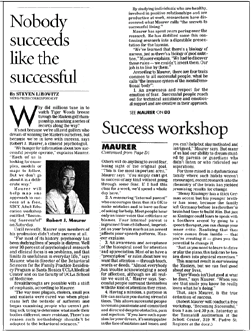 Why did millions tune in to watch Tiger Woods breeze through the Masters golf championship, smashing a series of records along the way?
Why did millions tune in to watch Tiger Woods breeze through the Masters golf championship, smashing a series of records along the way?
It's not because we're all avid golfers who dream of winning the Masters ourselves, but because we're in love with success, says Robert J. Maurer, a clinical psychologist.
"We hunger for information about how successful people operate," explains Maurer. "Each of us is looking for examples, models or maps to follow. But we don't go about it in a deliberate way." Maurer will help map one approach to success at a free, SBCC Adult Education workshop entitled, "Becoming Successful" on Saturday.
Until recently, Maurer says members of his profession didn't study success at all.
"For most of its history, psychology has been studying lives of people in distress. Well over 90 percent of psychological research and clinical focus is on problems, and that limits its usefulness in everyday life," says Maurer, who is director of the Behavioral Sciences for the Family Practice Residency Program at Santa Monica UCLA Medical Center and on the faculty of UCLA School of Medicine.
Breakthroughs are possible with a shift of emphasis, according to Maurer.
"The way most plagues, cholera, small pox and malaria were cured was when physicians left the bedside of sufferers and began examining people who weren't getting sick, trying to determine what made their bodies different, more resistant There's no reason such methodology shouldn't be adapted to the behavioral sciences."
By studying individuals who are healthy, involved in positive relationships and are productive at work, researchers have discovered what Maurer calls "the secrets to successful living."
Maurer has spent years poring over the research. He has distilled some of this continuing research into a digestible presentation for the layman.
"We've learned that there's a biology of success, just as there's a biology of good nutrition," Maurer explains. "We had to discover those rules - we couldn't invent them. Our job is to live by them."
According to Maurer, there are four traits common to all successful people, what he calls "the immune system of the mental/emotional body":
1. An awareness and respect for the emotion of fear. Successful people reach out for technical assistance and emotional support and are creative in their approach. Others will do anything to avoid fear, losing sight of the original goal. "This is the most important area," Maurer says. "You simply can't get to success of any kind without going through some fear. If I had this class for a week we'd spend a whole day here."
2. A reassuring "internal parent" who encourages them that it's OK to make mistakes and to have no fear of asking for help. Most people hear only an inner voice that criticizes or blames. Your internal parent is ingrained from childhood, imprinted on your brain much as an accent -affects your speech patterns, Maurer explains.
3. An awareness and acceptance of the biological need for attention and appreciation. Most of us have a "prescription" or rules about how we want that attention - through touch, words or deeds. "Almost everybody has trouble acknowledging a need for affection, although we all realize we want it," Maurer says. Successful people surround themselves with the kind of attention they crave.
4. Having a mission, a purpose in life can sustain you during stressful times. This allows successful people to remain passionate and committed and directed despite obstacles, pain and rejection. "If you have such a passion for your dream, it's unstoppable in the face of mistakes and losses, and you can't help but stay motivated and intrigued," Maurer says. But many of us had our ability to dream stunted by parents or guardians who didn't listen or who ridiculed our aspirations. For those raised in a dysfunctional family where such habits weren't encouraged, recent research into the chemistry of the brain has yielded promising results for change.
"Henry Kissinger has a thick German accent but his younger brother has none, because the family left Germany before his (brother's) brain had time to build it in. But just as Kissinger could learn to speak with a Southern accent by going to a speech therapist you can change your inner critic. Realizing that the voice comes from inside - that you're creating it - gives you the potential to change it.
"Just as you need to learn to drive or play the piano, this task can be broken down into physical exercises." This may not result in our winning the Masters, but we can feel good about our lives.
"Tiger Woods isn't just good at what he does," says Maurer. "When you see that smile you know he really loves what he's doing."
That, says Maurer, is the true definition of success.

